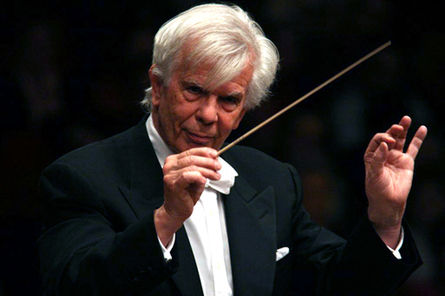People in the News
Christoph von Dohnanyi Dies at 95
 German conductor Christoph von Dohnanyi, whose near two-decade tenure as music director of the Cleveland Orchestra led a golden era for American orchestras, died in Munich on September 6. He was 95.
German conductor Christoph von Dohnanyi, whose near two-decade tenure as music director of the Cleveland Orchestra led a golden era for American orchestras, died in Munich on September 6. He was 95.
A proponent of contemporary repertoire, he was best known for his interpretations of the Second Viennese School. Trained in Germany’s opera houses, Dohnanyi had equal facility with opera and symphonic repertoire and launched the practice of semi-staging operas in Cleveland, a tradition copied by his successor. His tenure in Ohio, from 1984-2002, saw more than 100 recordings, making it the most-recorded American orchestra of the time. He also led over a dozen international tours including those to the Salzburg Festival, where it became the first American orchestra in decades to be a resident ensemble.
“Christoph von Dohnányi was a specialist for many styles, a grand seigneur among the great international conductors to whom the Salzburg Festival owes its world reputation,” noted Festival Artistic Director Markus Hinterhäuser. "Between 1962 and 2014, he led many unforgettable opera and concert performances here.”
Those included the great operas by Strauss and Mozart as well as concerts with the Vienna Philharmonic, Cleveland, and the Philharmonia Orchestra London. He led the world premieres of Hans Werner Henze’s Die Bassariden, in 1966, and Friedrich Cerha’s Baal, in 1981.
Of his Salzburg performances in 1995 of Bartók’s Bluebeard’s Castle and Schoenberg’s Erwartung, Gerhard R. Koch noted in the Frankfurter Allgemeine Zeitung: “Christoph von Dohnányi worked hard with the Vienna Philharmonic, not eschewing conflict. The results prove him right: the orchestra has rarely been heard in such fabulous form, including the necessary sharpness of tone; many details, both in Bartók and Schoenberg, have never been heard in such clarity; the compositional dramaturgies were overwhelmingly clear, precisely because they had not been smoothed over.”
In Cleveland, his clarity and precision on the podium were enhanced by deep study of the work at hand and by an uncannily strong artistic connection with his players.
For additional informaton:





 FEATURED JOBS
FEATURED JOBS

 RENT A PHOTO
RENT A PHOTO


